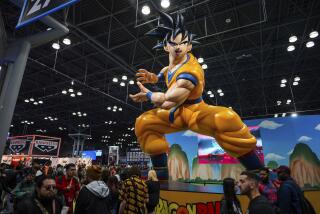China hopes new film studio and theme park will boost ties to international movie industry
Reporting from Beijing ‚ÄĒ China is building a $2-billion film studio and theme park complex in the southwest metropolis of Chongqing based on a political initiative by President Xi Jinping.
The elaborate park ‚ÄĒ which will include a film studio, theme park and office compound ‚ÄĒ will be named after Xi‚Äôs ‚ÄúOne Belt, One Road‚ÄĚ program, a massive effort to establish new trade and transportation routes across Europe, Asia and East Africa, the official New China News Agency reported Monday.
The park, in Chongqing‚Äôs mountainous Wulong county, ‚Äúwill serve as a platform to ‚Ķ boost exchanges and cooperation among Chinese and foreign film enterprises,‚ÄĚ Tan Nianshen, the project manager, told the agency. Construction will begin in 2017.
China‚Äôs ruling Communist Party has spent billions of dollars in recent years to bolster the country‚Äôs cultural industries, hoping to both offset the influence of Western culture at home ‚ÄĒ Xi has blamed ‚Äúhostile foreign forces‚ÄĚ for a range of domestic problems ‚ÄĒ and promote a positive image of China abroad.
‚ÄúOne thing that‚Äôs striking is that the government has announced the plan ‚ÄĒ not private companies, but the government itself,‚ÄĚ said Stanley Rosen, a USC political science professor and Chinese film expert. ‚ÄúI think it‚Äôs a political decision more than anything else.‚ÄĚ
Lower government officials want to ‚Äúpromote One Belt, One Road as much as possible,‚ÄĚ he continued, ‚Äúand having film as a part of that makes political sense more than economic sense.‚ÄĚ
China’s box office will soon surpass the U.S. as the world’s largest, and Hollywood filmmakers are scrambling for a piece of the pie. Director Steven Spielberg last month announced a partnership with Jack Ma, China’s richest man, to help produce and distribute movies in China. Ma’s Alibaba Pictures will buy a stake in Spielberg’s Amblin Partners production company as part of the collaboration.
The Chinese conglomerate Dalian Wanda has also been on a Hollywood buying spree. This year, Wanda formed a partnership with Sony Pictures and acquired Legendary Entertainment ‚ÄĒ the production company behind ‚ÄúThe Dark Knight‚ÄĚ and ‚ÄúJurassic World‚ÄĚ and ‚ÄúGodzilla‚ÄĚ ‚ÄĒ for $3.5 billion. It tried, unsuccessfully, to acquire a major stake in Paramount Pictures.
Next year, Legendary Entertainment and Universal Pictures will release ‚ÄúThe Great Wall,‚ÄĚ the first major Hollywood movie produced, filmed and set in China. The action-adventure epic features Matt Damon and Willem Dafoe, alongside Chinese heartthrobs Andy Lau and Wang Junkai.
Wanda, which has close ties with the Chinese government, is building what it touts as ‚Äúthe world‚Äôs largest film and television studio‚ÄĚ in the eastern Chinese city of Qingdao ‚ÄĒ a 400-acre complex with 30 soundstages. The first phase is scheduled to open in 2017.
‚ÄúI‚Äôve never seen governments in other countries put as much energy into entertainment as I‚Äôve seen the Chinese government do,‚ÄĚ said Kelly Ryner, president of Thinkwell Asia, a branch of Los Angeles-based Thinkwell Group, which specializes in the creation of theme parks and other entertainment venues.
Wanda is also challenging Western dominance in theme parks. Wanda operates two parks in China, has plans for nearly a dozen more and recently hired a former Disney executive to take charge of its theme park group.
Western theme parks in China, including Shanghai Disneyland and the upcoming Universal Studios Beijing, draw largely on Western motifs, Ryner said, such as sleeping princesses and hungry dinosaurs.
‚ÄúIt‚Äôs really logical that the next step would be for the government to look at creating something on a similar scale that is very much Chinese intellectual property,‚ÄĚ she said.
Details of the Chongqing park’s finances, and its relationship to government agencies, remain unclear.
The park is being built by a Chongqing-based subsidiary of ZYHJ Industry Investment Capital Ltd., an investment firm that was registered in Hong Kong in 2013 with about $650 million in capital. The firm has holdings in construction, media, healthcare, communications and several other industries, according to its website.
The New China News Agency said that ‚Äúpartners in about a dozen foreign countries will participate in the operation of [the Chongqing park‚Äôs] projects, including the theme park and the tourist town.‚ÄĚ
Yet when reached by phone, Liu Jin, chief executive of the Great Nation Silk Road Television and Film Culture Company ‚ÄĒ the Chongqing-based subsidiary ‚ÄĒ refused to give their names and said he ‚Äúdoesn‚Äôt know them.‚ÄĚ
He said that the subsidiary has 30 employees and that other details were ‚Äúconfidential.‚ÄĚ
Chinese leaders boosted the country‚Äôs cultural protectionism this month with passage of the country‚Äôs first film law. The legislation places a tighter chokehold on movie content, forbidding material that damages China‚Äôs ‚Äúnational dignity‚ÄĚ or hurts ‚Äúnational feelings.‚ÄĚ
Foreign films already face strict limitations. Officials usually allow 34 foreign movies into the country every year, and these face censorship for material considered politically inappropriate or lewd.
The law says that filmmakers should ‚Äúserve the people and socialism,‚ÄĚ according to the New China News Agency.
Nicole Liu in The Times’ Beijing bureau contributed to this report.
ALSO
How Chinese is Shanghai Disney?
Chinese satire tops box office despite claims by director that Wanda Cinemas sabotaged his film
More to Read
Sign up for Essential California
The most important California stories and recommendations in your inbox every morning.
You may occasionally receive promotional content from the Los Angeles Times.










